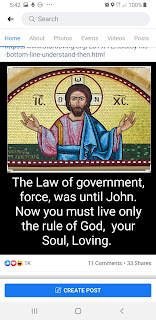Even more than Tolstoy, in this book and in Christianity and the social crisis he lays bare the 2,000 years of Destruction that the church has waged on the teachings, the gospels, of Jesus. It is the history of the church that I have my whole life. How useful. But as a young person my soul knew that something was horribly horribly wrong. My religion is expressed quite well in all but a few sentences of the gospel and distorted by most of the rest of the Bible and virtually all of the church..
And yet he works within the church. Is it inslavement ment? Is it lack of courage? Probably it is strategic in the same way that Tolstoy uses the word Christianity. Both of them saw service to humanity by utilizing the deadly monster that is the Christian church For good by moving it for good.
It is the view of James that this has always been a deadly mistake. History kind of proves it. The founder or rather the rock to which the church at least points never did this period it replaced Judaism it did not seek to reform it or improve it. The church is a commercialization for personal and private gain of empires of individuals of church hierarchy. It is an incredible abomination and may single handedly have destroyed the human species and the planet by robbing it of the only medicine that might have saved it, the pure morality distilled in the teachings and life example of the man Jesus

"If sin is selfishness, salvation must be a change which turns a man from self to God and humanity. His sinfulness consisted in a selfish attitude, in which he was at the centre of the universe, and God and all his fellowmen were means to serve his pleasures, increase his 98 A THEOLOGY FOR THE SOCIAL GOSPEL wealth, and set off his egotisms. Complete salvation, therefore, would consist in an attitude of love in which he would freely co-ordinate his life with the life of his fellows in obedience to the loving impulses of the spirit of God, thus taking his part in a divine organism of mutual service. When a man is in a state of sin, he may be willing to harm the life and lower the self-respect of a woman for the sake of his desires; he may be willing to take some of the mental and spiritual values out of the life of a thousand families, and lower the human level of a whole mill-town in order to increase his own dividends or maintain his autocratic sense of power. If this man came under the influence of the mind of Christ, he would see men and women as children of God with divine worth and beauty, and this realization would cool his lust or covetousness. Living now in the consciousness of the pervading spiritual life of God, he would realize that all his gifts and resources are a loan of God for higher ends, and would do his work with greater simplicity of mind and brotherliness. Of course in actual life there is no case of complete Christian transformation. It takes an awakened and regenerated mind a long time to find itself intellectually and discover what life henceforth is to mean to him, and his capacity for putting into practice what he knows he wants to do, will be something like the capacity of an untrained hand to express artistic imaginations. But in some germinal and rudimentary form salvation must turn us from a life centred on ourselves toward a life going out toward God and men. God is the all-embracing source and exponent of the common life and good of PERSONAL SALVATION 99 mankind. When we submit to God, we submit to the supremacy of the common good. Salvation is the voluntary socializing of the soul. Conversion has usually been conceived as a break with our own sinful past. But in many cases it is also a break with the sinful past of a social g...

























